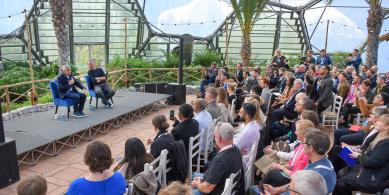“Madness is to think of too many things in succession too fast.” (Voltaire)
Do you know that every year – on the 20th October - hundreds of thousands of people all over the World celebrate an “International Overload Day”? During the day, people are asked to stop checking their emails every time they pop up, log in in the email client only five times, turn off the ringtone of their smartphone, including the vibration (to avoid to continuously check the SMS).
Nothing surprising for any of you, I suspect. We were told that we now live in a new Working Arcadia. A time in which you can work anywhere, anytime, informally and without limits. Be Informal is now the New Formal, Be Flexible is now the New Mainstream. The Internet is giving us unlimited and democratic access to all the information you could dream of, no barriers! Our tech devices are more and more sophisticated, providing a powerful boost to our capabilities and potential. They are even changing our relationship with the World around us, which is now more and more Virtual…
However… there is a little price to pay for living in such a Dreamland. Being “Always On”! It sounds great but – as Lewis argues – it leads to quite disturbing consequences. The most important one is the fact of being continuously interrupted while trying to develop an idea or…simply thinking. Does it sound familiar?
This is not a new debate. A few years ago while working on making social media accessible through mobile devices, we learned that a key motivation for accessing e.g. Facebook through mobile was the FOMO (Fear Of Missing Out). Teenagers – now older Millennials - were terrified of not being constantly “in the loop” with their network of friends. Therefore, accessing social media through mobile was essential, even vital.
What Lewis describes is, I believe, a sort of “Universal FOMO” touching every aspect of our lives – and not only work. Moreover, he introduces new interesting expressions to describe this phenomenon. “Busyness”, “Hurry Sickness”, “Telephonobia”, “Ping Pong Ring”, “Toxic Inhibition”.
The most important victim of all this is Creativity, according to Lewis. Creativity needs time and focus (”being uninterrupted”), but this is now a luxury that is not on sales anymore, it is just not part of the New Normal! In addition, the overwhelming focus on “Data”, “Analytics” and “Information” is pushing our brain more and more on the right side, while the left – that is, the “creative” side – is marginalised. “Left” comes from an ancient Anglo-Saxon word -“lyft”, meaning “weak” – and things are getting harder and harder for that side of our brain.
By interviewing scientists, academics, business leaders, army officials and other leading professionals, Lewis discovers a very interesting insight on creativity. All these people developed their best ideas not at work, but when they have time for themselves or even when they are doing something completely different. When they “focus” – no interruptions and no interrupting“connectivity” – their ability to create is at its best!
Based on these observations, Lewis develops a model to train people to allow creative ideas to emerge before they are cancelled by constant interruption and distraction. It is a model based on eight creative traits called QED3RPT (or “Quiet-too-fast-to-think”). They are simple and clear principle that anyone could apply in virtually any human field, not only at work
“Creativity is the residue of time wasted” (Albert Einstein)
Logical, isn’t it?
Warmly recommended.
Join our Book Club.
We'd love you to write a 300-word review for our book club or if you're an author get in touch - We've got lots of members keen to review your book. Contact the content team to find out more.
Newsletter
Enjoy this? Get more.
Our monthly newsletter, The Edit, curates the very best of our latest content including articles, podcasts, video.
Become a member
Not a member yet?
Now it's time for you and your team to get involved. Get access to world-class events, exclusive publications, professional development, partner discounts and the chance to grow your network.




